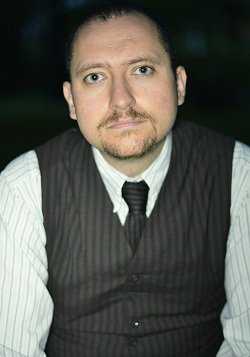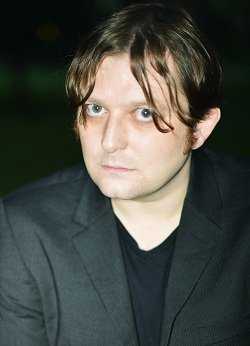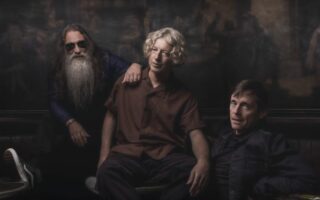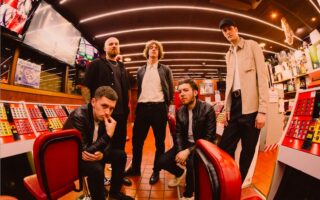St. Pancras Old Church is set just off the main road leading to Kings Cross St. Pancras station. It’s a well known location, often serving as a live venue as well as a parish church. It’s a work of Victorian splendour set away from the hustle and bustle of Euston Road but close enough to occasionally bear the hiss of a braking train inching into the city.
As the light begins to fade and the crowd starts to form Live4ever took a walk with Artmagic’s Richard Oakes and Sean McGhee earlier this week, sheltering under the lush green trees of St. Pancras Gardens (still recognisable as one of the settings of The Beatles 1968 ‘Mad Day Out’ promo shoot) to chat about the genesis of Artmagic, future touring and second album plans, and which member of Fleetwood Mac they would like to have been…
First of all thanks for finding the time to talk to us. Now individually you have well established careers, Richard with Suede and Sean as a writer and producer, so how did the opportunity to work together come about? And where does the name ‘Artmagic’ come from?
Richard Oakes: Sean will have to explain the name..
Sean: Well obviously certain options were taken off the table.
Oh, so were there alternative name suggestions?
Sean: I have a friend who is insistent to this day that the band should’ve been called ‘Dangerous Rain’.
Richard: I got a colleague who wanted us to be called ‘The Whips of Fear’.
Sean: Did he really suggest that?!
Richard: Yes.
Sean: Let’s move right on.
So where does Artmagic come from?
Sean: It comes from, you know the American film maker John Walters who made Pink Flamingos and Pecker and all of those films? There’s a Q&A he did where he was talking about how he loves modern art and he’s a modern artist himself on the quiet because you can take any rough assemblage of objects and put it in a certain way and say, ‘Hey everybody, it’s not a load of trash, it’s art’. Well he said art is transformative, it’s alchemical and I thought, ‘That’s brilliant’ and really sums up what we do as writers, because you can’t really explain the writing process to anybody. I always liken it to building a house in grains of sand. It’s like little disparate ideas and thoughts and emotions and musical riffs and gradually it forms into a whole but when you look back at it afterwards not only can you not know really where it came from but you can’t really explain to somebody else either, so it seems like magic.
So how did you end up working together then? I mean Richard you are also back with the recently reformed Suede?
Richard: Well I hooked up with Sean a good 18 months before all that happened, which is something I think most people don’t realise because Artmagic only came into the public domain really once we had the name and the website and everything and that was after – I mean only a couple of months – but that was after Suede reformed so I think people assume that we came after. But we didn’t, it was like 2008. Actually there were sort of rumblings in about 2007. I got a show-reel of Sean’s through from my manager Charlie, manager of Suede, and I thought it was really good you know, and he said this guy’s really interested in working with you. But we didn’t actually get it together because other things were going on and Sean was very busy with Temposhark at the time so we didn’t really get it together until about summer 2008.
Sean: Yeah, I produced two albums, like back to back pretty much, for an artist called Temposhark and did a lot of pop writing right in the middle of it. So when we started writing it was like snatching days here and there.
Richard: Yeah, Sundays…
Weekend work?
Richard: Yeah, yeah!
Sean: …and eventually when we got a few songs under our belt it was like this is too good not to be focussing on more intensely. So at that point it became a more of a full time thing. And it was the beginning of 2010 that we started producing properly.
Richard: Yeah, that was when I first shipped all my gear over to Sean’s and we started recording properly and doing it ten hours a day or whatever, five days a week or whenever we could manage it. That’s when the real hard work started. Yeah, the writing happened over a long period didn’t it? From 2008, well it carried on into 2010 didn’t it?
Sean: Well it carried on into 2012. We wrote some new songs for the album like for the bonus tracks and things like that only three months ago.
And how does your collaboration work? Is it a case of one of you has an idea and then you both work on it? Do you work independent from each other or both in the same room?
Sean: Well, all of the above really depending on circumstances.
Richard: Yeah, I always think of it that the backbone of what became the album, the music, was done by me before I met Sean. I spent a long time building a studio. I moved house after Suede split, built a studio and spent a long time kind of thinking, ‘What the hell am I going to write now? I don’t have to write within any kind of boundaries any more. No pigeonholes. There’s no logo to think about!’. I could do anything. So I wrote a whole load of very confused music.
Sean: Good confused though, and that’s what got me inspired..
Richard: There were demos that I would do like the ‘I Keep Walking’ one that I’d sort of done the night before. I finished it Saturday night and put loads of guitars on it and on the Sunday I took it to Sean’s and thought, ‘Oh, he’s going to hate this’ and brought it round saying, ‘I’m really sorry about all the guitars’ and he was like, ‘No, they’re great! Let’s keep them!’ and the song was written.
Sean: And it was one of those songs where it was just quite rare where the melody and the lyric and everything came at once, like that, fully formed. You got there at midday and there was like two hours that we had and I wrote the ‘The Choice’ that morning over Richard’s backing track as well (laughs). It was good day.
I notice that there’s a lot of piano on the album which was quite a surprise because obviously Richard it primarily known as a guitarist. Does that change the way in which you write compared to writing on guitar?
Richard: Yes it does, yeah. I mean you end up writing in different keys. Writing on the guitar you have to be very careful not to fall into certain ruts. I wrote on guitar for ten years and, you know, I wrote in certain styles and I was eager to try and break out of ‘this-is-the-way-it-sounds-when-Richard-Oakes-writes-a-song’ – eager to try and break out of that. And even when we met I was saying, ‘I don’t want it to sound like anything I’ve done before’, and you were saying, ‘Don’t throw your tools away, if they’re useful and they’ve been successful for you, you don’t try and bury them.’.
The album has a very eclectic sound to it. What would you say are your main influences? Who inspires you?
Richard: I suppose the one I always come out with, constantly come out with; I’ve got to find a different influence point, is Field Music. I kind of discovered them properly and was getting into them not long before I started working with Sean, around 2007.
Sean: And introduced me to them.
Richard: Yeah, and they had done two records then and I was thinking. ‘That‘s the kind of band I want to be in’. Just felt that they were focussing on the actual songs and the music and not worrying about any of the other fluff that goes with the industry. And I think they’ve managed to keep that going throughout their whole career really.
Sean: I write pop melodies, that’s what I do. I make my living off my songwriting, and it’s not because I’m suddenly thinking, ‘Oh god I have to have something pop’, it’s just that those kind of melodies come to me naturally. It’s what I do; it’s what I’m good at, so it was trying to find ways to be emotional and reflective around the music which he was giving me whilst still making something that will be memorable and touching and beautiful. You know, beauty, I keep using the word beauty but it’s true, I’m always aiming for beauty. I’m not ashamed to be mildly pretentious; I’m not ashamed for the quest for beauty at all. I think it’s a much underrated thing really. And the things like ‘Half-Life’ from the album is a good example where Richard brought over the most gorgeous, funny, melancholic staircase of chords in his music and it was so beautiful and I was in a really awful mood that day. I was thinking my life was going to shit and it was all terrible. And I kept saying, ‘I don’t know if this is going to work today, I’m really sorry, I don’t know if it’s going to work’ and we wrote ‘Half-Life’ and it’s just me transposing those feelings directly on top of that beautiful staircase of chords.
I was about to ask, do you have a personal favourite song on the record. So Richard, is yours also ‘Half-Life’?
Richard: Mine is probably ‘The Spark’, which we are going to première tonight live. You know, first time premiere for the first time…well, we’re going to play it. And I just thought that is an example of an idea that I had that really did come to fruition in the recording process, and we used Mike Sorrentino who played drums down the wire in New York. I’ve still not met him to this day. He drummed on about four or five tracks..
So what are your touring plans for the rest of the year? I note there are a few gigs in churches such as tonight’s event. Was that a conscious decision?
Sean: Bit of luck really.
Richard: Yeah, and those are the options that fell on us.
Sean: It’s worked out well though, I like the idea. We can be quite torch-songy at times and that works brilliantly in a place like this. We’ve got a bunch of stuff booked for September. And we have festivals coming up in a couple of week’s time.
Richard: Yeah, that’s going to feel like being on tour! Being in the back of a van afterwards, stuck on the M6.
Flashbacks of the old days…
Richard: Yeah, yeah!
Sean: Well we also have our second single ‘Down In The River’ coming out at the start of October and we are planning some endorsed shows around that – one of which will be the full band and one will be just the two of us. We’re also in the middle of planning some tour dates for September so we have already confirmed Liverpool, Manchester, Birmingham and we plan to do more UK dates around it to give the album the best support we can really and then we’ll take it from there. So yeah, we’ll be busy! There’s plenty more work to do for this record.
So is Artmagic a permanent project? Can we expect more material?
Sean: I wish people would stop asking that. What is this question?! Just because it’s another band doesn’t mean…
Richard: …I think people are worried about the industry, maybe that’s the point?
I think you’re right, people are uncertain about the industry.
Richard: We’ll outlive the industry, let’s put it that way..
Sean: Everybody multi-tasks now. Everybody has to be in one band or two bands or three bands and do other things to support themselves on the side. But this is something that is really important to both of us, and just because I have a career as a producer and he has another band doesn’t mean to say that this is like some weird little one-off – you don’t spend so much time on something like this for it to be a one-off.
I wasn’t suggesting that it was going to be a one-off, but trying to establish if this will become more of a permanent focus of your attention or whether it will be a project you continue to do as well as.
Sean: Oh no, not at all, it’s really important to both of us. We’ll continue Artmagic.
Richard: It’ll always be on-going.
So are you already planning and writing the second album?
Sean: Second album, probably not next year but the year after. We’ve already made broad plans about the kind of things we might like to try.
Richard: Depends how quickly it gets written really. If we’re really on it we can write six songs in two weeks..
Sean: I want to make the next one faster, obviously, because we’ll be able to do it while not trying to fit it in around other things. We’ll be able to say, ‘We’re doing this now’ and so we can dedicate this amount of time to it which we weren’t necessarily able to do last time around. But absolutely, there will be a cannon of records, there won’t just be this one. Anyone using the term vanity project will be taken out and shot.
Finally then, if you could be in any band in the history of popular music, with the exception of Suede or Artmagic, what would you choose?
Sean: To be honest I can think of more gigs that I would’ve liked to gone to as a punter. So if you gave me a TARDIS I could give you a long, long list of shows that I would’ve liked to have gone to but could’ve never gone to see. But I don’t think there are many bands that I would’ve wanted to be in because they’re the bands I love because of who they are.
Richard: I would’ve liked to have been Mick Fleetwood because he was the only member of the band that didn’t go nuts. And also cos having been doing it for about ten years he was thinking this isn’t going too well and then suddenly then become huge and everything you’ve worked for gets piled in your direction and you turn into a rock…idiot. Well, not idiot but I suppose a bit.
Sean: I suppose I was always kind of hoping to grow up to be Phil Oakey from The Human League. And in a strange way I both have and definitely haven’t. Yeah, I think The Human League Mark II circa 1980 would’ve been quite good fun. And Human League Mark I circa 1978 would’ve been hilarious as well. I could’ve been Adrian (Wright) doing the slides. You know, here’s our band – two guys with synthesizers, a paint machine, a man with hair like this (covers one side of his face with his hand) singing and a guy on slides. I love that. That’s much better than being ‘Oh, I was in the Stones, man, and it was all a bit rock and here’s my foot on the milestone’. I’d much rather be in a band where you have a tape machine and asymmetric haircuts.
Artmagic’s debut album ‘Become The One You Love’ is out now





